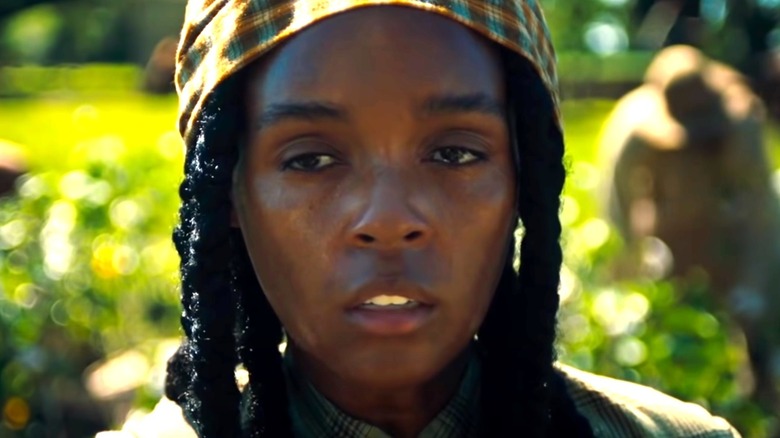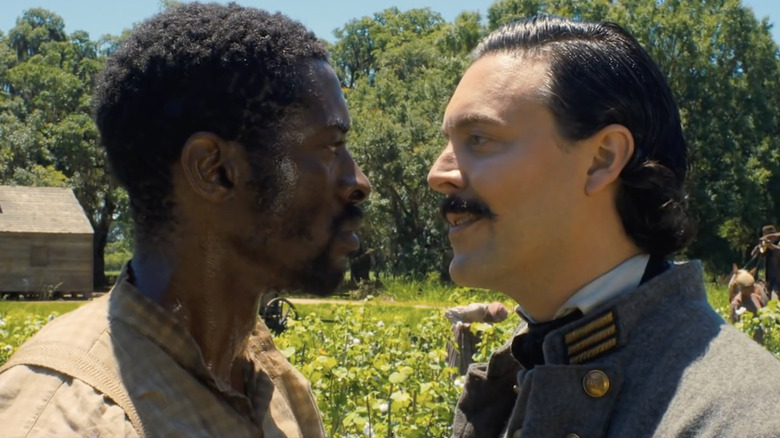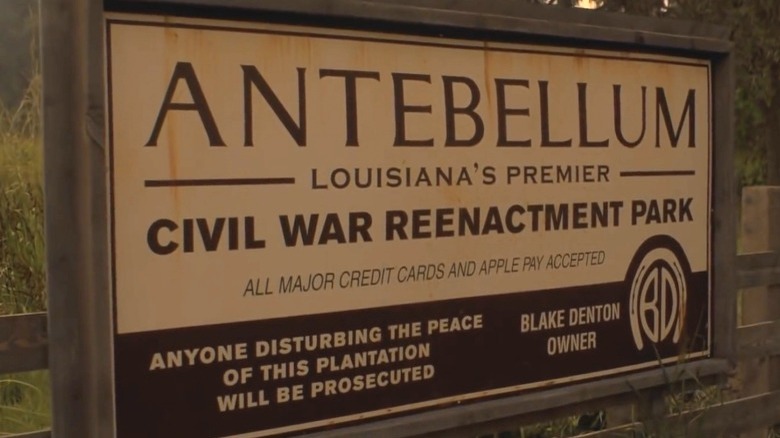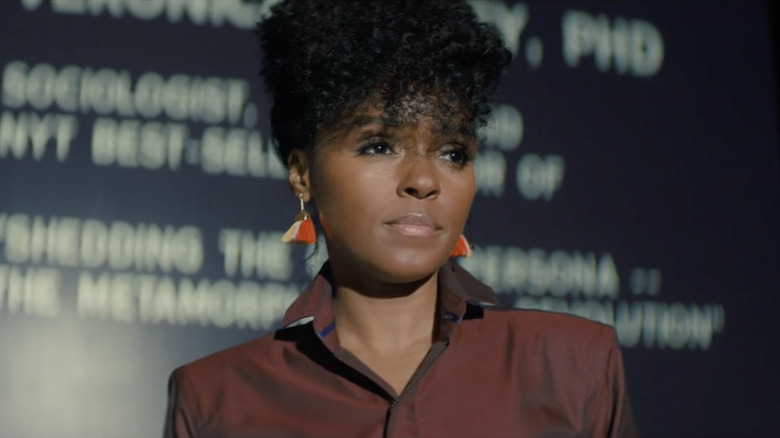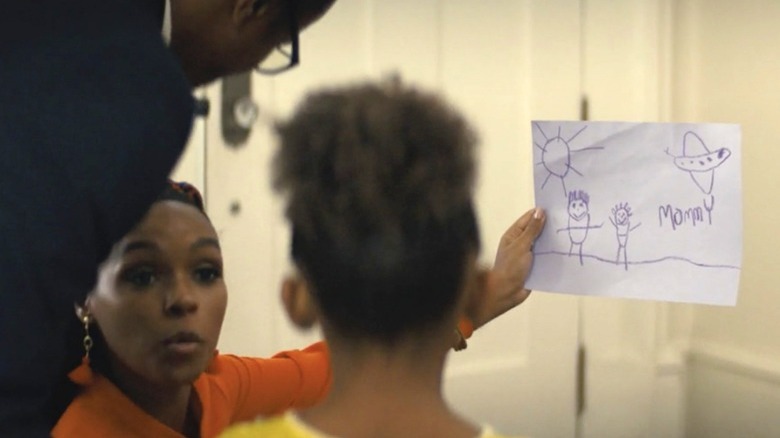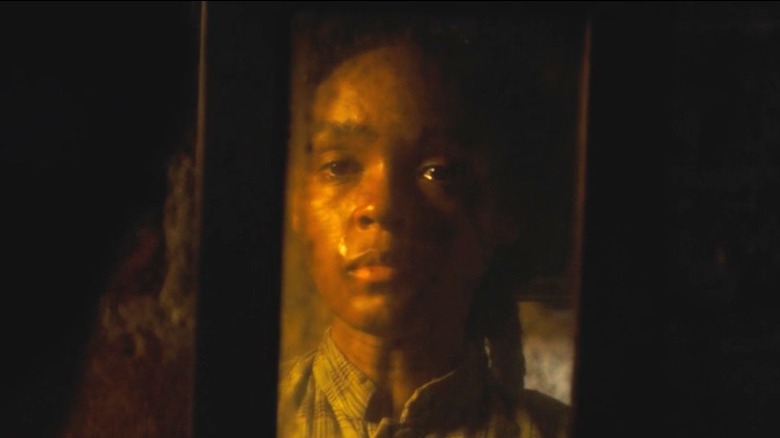The Ending Of Antebellum Explained
The psychological thriller "Antebellum" is a thought-provoking film written and directed by Gerard Bush and Christopher Renz that keeps audiences in the dark until the sinister twist is revealed. Critics didn't much admire it (via Rotten Tomatoes), but "Antebellum," starring the talented and mesmerizing Janelle Monáe as author and activist Veronica Henley, did end up being a force to be reckoned with on digital platforms — it became the No. 1 rented film on FandangoNow and Apple TV while also being the most rented title on Amazon Prime Video during its initial week of release. And the movie was in the top ten of the most popular PVOD titles released during the COVID-19 pandemic as of October 2020 (via The Hollywood Reporter).
The structure the film employs to tell the story is somewhat unique, keeping viewers guessing by jumping around timelines and fluctuating between the past and the present. Masterfully interwoven are several poignant issues involving civil rights, racism, and how the past never really stays in history. There is a lot to unpack once the credits start to roll on "Antebellum," and it's no surprise if people have this flick on their minds long after it ends. Here is some insight into how the narrative reaches its intriguing conclusion.
Subtle hints the plantation is in the present
The shock factor behind the jaw-dropping ending is, without a doubt, superbly assisted by the idea the film initially sets up. The thriller starts with a quote from William Faulkner: "The past is never dead. It's not even past." Without wasting any time, "Antebellum" goes out of its way early to get viewers to see the link between then and now, which only continues to add to the mystery of when the events are taking place.
From the clothing to the aesthetics, the plantation in "Antebellum" looks incredibly authentic. Civil War gunfire can be heard as Veronica and the other prisoners continue picking cotton while being abused and tortured. New captives arrive, and some, like Julia (Kiersey Clemons), who knows Veronica can free them, understandably want to escape. Unknowingly, this is the first of several hints that the "past" is the present. In fact, Gerard Bush and Christopher Renz left several small clues that indicate that the plantation is in the modern era.
One such clue is that the song the professor (Tongayi Chirisa) whistles while in the fields is James Weldon Johnson's "Lift Every Voice and Sing," which was not written until after the Civil War. There are also several indications when it comes to some of the familiar faces featured in and around the edges of the frame.
Hiding in plain sight
Elizabeth (Jena Malone) makes no effort to hide the fact that she is pursuing Veronica. She playfully taunts her prey on a video call and puts forth little effort to cover her tracks at the hotel before the rideshare kidnapping occurs. She even sends her daughter into the elevator beforehand dressed in old-fashioned clothing and carrying a Black doll on a leash like something out of "The Shining." These vile Civil War reenactors are so intoxicated with white privilege that they truly believe they are untouchable, thus their callous approach to human trafficking. The fact that they can preserve this archaic way of life, easily kidnapping anyone from regular people to those with celebrity status seen on television with no recourse, is as unnerving as it is despicable.
But Elizabeth isn't the only person partaking in the sadistic game hiding in plain sight. The hotel concierge is later seen sitting with Senator Denton's (Eric Lange) daughter during the scene at the plantation's dining hall, and some of the white people in the audience of Veronica's speech or at the restaurant where she has dinner appear at the reenactment park.
These well-placed hints add to the eerie revelation that people with warped views don't always look the part and come in many forms. The frightening notion is amplified when viewers find out the villains aren't the only one's operating in plain sight — the entire Antebellum-themed park is doing so as well.
A truly nightmare-inducing villain
What makes the reveal at the end of "Antebellum" so chilling is the well-crafted misdirect. Most people watching the film probably expected supernatural elements were at play or that time displacement was the culprit behind the harrowing ordeal. Those ideas are almost comforting because they exist only in fiction, making the horrible things witnessed throughout seem like they could never happen today. The shocking surprise is not only that these atrocities are happening in the present day but also that they are happening right under everyone's noses.
As Veronica rides to freedom, it is revealed that she and the other Black captives have been imprisoned within a Civil War reenactment park owned by Denton called Antebellum. The film comes full circle with this reveal, attempting to offer up a rude awakening for anyone curious to know what they are supporting when they visit places that honor a time of suffering. Certain ideals, if kept alive, will continue to prosper. Preserving the Confederate way of life will inevitably bring back the absolute worst of it in some way, shape, or form. It isn't about rewriting history. It's about making sure we don't make the same mistakes over and over again.
The real terrifying villain is the ignorance of a shameful time remaining strong enough to continue to be a cancer on society. If "Antebellum" was looking to turn that into a horrifying monster, it succeeded on several fronts.
Veronica's carefully calculated escape plan
From her horseback riding ability (as seen in the photo at her apartment) to her practice of yoga, the skills that Veronica uses in her daring escape are set up throughout the narrative. Early on, Veronica is shown doing acrobatics to avoid creaky floorboards in her cabin on the plantation.
Later in the movie (but earlier in time), she is seen practicing yoga in her hotel room, her instructor telling her, "Visualize yourself addressing any obstacles you might face with the same determination and focus that you brought to your practice today. See yourself emerging successful and victorious on the other side." Yoga not only helps her maneuver undetected but also gives her wisdom and the driving force she needs for her strategy to succeed.
Her plan to keep her head down and play the sick game until her captors' ignorance and complacency get the better of them is laid out perfectly in her book speech. Gerard Bush confirmed this to Essence: "In her speech [about her book], without Veronica realizing it, she's actually creating the roadmap for how she's going to [escape Antebellum]. She says that their arrogance is their greatest vulnerability, and that they're not paying attention. Right? So she's basically giving you, giving the audience, a roadmap as to how she is strategizing when you think that she's being silent."
The headhunters at Antebellum greatly underestimated Veronica, who had all the skills necessary to not only escape but also take them down in the end.
It's more than just a plane
Veronica has several goals she tries to accomplish in the film before it's all over, but her biggest motivation isn't just escaping the waking nightmare or taking down her captors. Her biggest motivation is returning home to her husband, Nick (Marque Richardson), and daughter, Kennedi (London Boyce), which gives her the strength to survive.
Everyone remembers the plane flying overhead before the credits begin to roll, and while some may think this was just a cool shot to end on, that is certainly not the case. The plane has a significant meaning, and it symbolizes Veronica fulfilling her promise to her daughter earlier in the story.
When talking to Essence, Gerard Bush revealed that the idea behind the scene where Kennedi gives her mother a picture before she leaves is to greatly add to the emotional impact of the ending, explaining, "You remember when she says to her daughter, 'When you look up in the sky and you see that big airplane, you'll know that that's Mommy coming home to you?' So when she escapes and she crosses the Antebellum sign, and Vagabon's 'Home Soon' is playing, when the plane goes overhead, that is representing metaphorically that she's made it home."
The plane, the song, and the powerful imagery firmly establish that Veronica's resilience, strength, and love for her family were what she needed to overcome such evil, leaving audiences with the idea that if people maintain those ideals, they can survive anything.
Justice vs. revenge
During her escape, Veronica burns Denton and Captain Jasper (Jack Huston) alive in the shed where the Professor's wife's body was cremated and drags Elizabeth on a rope by her neck until her head hits the base of a Confederate statue, killing her. But is this vengeance or something else?
According to the writers, what many will see as revenge, they view as necessary for Veronica to ensure that the park is shut down and those responsible cannot get away with it. In an interview with Essence, the writer-director duo said, "Veronica knew that justice wouldn't be served if she left it to the police, and if she left it to the powers that be. She took that into her own hands that these people need to be punished. What some people call revenge, for Black people, within the context of this movie, I call it justice. And also, metaphorically, it represents burning the whole thing down. When she walks away, she is the Black Lady Liberty, torch in hand."
Revenge is usually backed by selfish reasoning, meaning the motivation is purely for one's own benefit, whereas Veronica's actions clearly serve as a necessary means to an end. As prominent and well-connected political figures, all three of them have a good chance of escaping prosecution and thus having the opportunity to continue their efforts. She is fighting not only for herself but also for the future.
Igniting the flames of justice guarantees Antebellum's extermination and is a fitting end for such diabolical villains. If there are any plans for a sequel, it won't be set at this location because its driving force has rightfully been reduced to ash.
